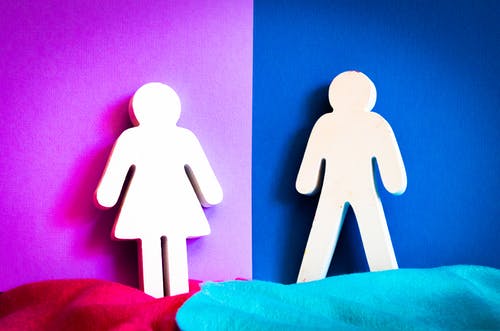It’s likely that everyone will accidentally misgender someone at some point. While few do so with the intent to cause any offence, it’s important to know what to do in response. Great societal movements such as the LGBTQ+ community have become an integral part of all our lives, and they help to promote acceptance and diversity in the workplace. This is essential to creating a friendly and comfortable environment for everyone.
So, what should you do if you accidentally misgender someone at work? Here, we discuss the importance of using the correct pronouns when talking to co-workers and what to do if you accidentally misgender someone.
Prioritise their feelings, not your own
Although making the mistake of misgendering someone can make you feel embarrassed and guilty, it’s important not to let your feelings take priority over theirs. In the moment, you might be quick to try and defend your actions and explain how you have good intentions, and you didn’t intend to cause any offence. While this reassurance might make you feel better, it ignores the other person’s feelings.
So, rather than trying to defend your own ego by thinking “How can I make myself look like I’m not a bad person?”, think “How can I make sure this person is okay?” and centralise their feelings over your own.
Don’t turn the mistake into an even bigger one
When you accidentally make the mistake of misgendering someone, sudden feelings of panic and embarrassment might make you want to react in a dramatic and over-the-top type way that draws an unwanted amount of attention to your mistake. This could make the person feel their gender has been centralised in the conversation and make them feel uncomfortable.
Instead, acknowledge you made a mistake and quickly correct the pronouns you used, rather than panicking in the moment and derailing into a conversation that focuses on their gender.
What to do if you repeat the mistake
If you make the mistake twice of misgendering someone, defending your actions with sentiments such as “I’m sorry, I’m working on it” or “It won’t happen again” isn’t helpful. It is best not to state these things but rather work on them in your own time.
If you’re uneducated on the correct use of pronouns, then this might be why you keep unintentionally making the mistake of misgendering your co-workers. If so, then it’s important you take the time to research into this to help promote an accepting and respectful work environment.
The term ‘think before you speak’ could not be more relevant in this case. When in a conversation with a member of the LGBTQ+ community and you have made the misgendering mistake before, slow your speech and think what pronoun is the correct one to use before the words form into a sentence.
How employers can show their support
Now that we’ve discussed what to do if you make the mistake of misgendering a co-worker, it is also important that employers show their support for the LGBTQ+ community and embed this as part of their core values. Here, we discuss a few ways that employers can do this.
The use of badges
Other than being used to help everyone learn each other’s names, pronoun badges can be a great way to help support gender identity and gender diversity in the workplace.
As demonstrated by the British telecommunication company O2 during Pride History Month, the business now allows its employees to express their gender identity on their badges. O2’s LGBTQ+ network, Proud@O2, uses badges as a way to help promote equality and acceptance of people that identify as transgender, non-binary, or gender non-conforming in the workplace. The scheme also aims to normalise the use of different pronouns, such as they/them, for both its customers and its staff.
Although pin badges seem just a small addition to employees’ everyday work outfits, the cause that they support and stand for speaks volumes when it comes to helping promote diversity and acceptance. If you find yourself misgendering someone at work, it may be beneficial for you to suggest pronoun badges be implemented to help.
International Pronouns Day
Taking place on the third Wednesday of every October, International Pronouns Day is dedicated to making the use of the correct personal pronouns commonplace. Not only does the day aim to help educate people on the correct pronouns, but it also highlights why it is important to use them correctly.
Misgendering someone can have a damaging impact on transgender and gender-nonconforming people, so it is vital that employers use this day to help raise awareness of this and help make using the correct pronouns the norm in the workplace and greater society.
Celebrity influencers who have used their platform
During last year’s iHeartRadio’s Jingle Ball event, Shawn Mendes accidentally made the mistake of misgendering English singer songwriter Sam Smith. After Mendes apologised to Smith on his Instagram story, Smith responded: “We’re all learning together. Happy holidays, all my love xx”.
Celebrities using their platform to help highlight the importance of using the correct pronouns and the correct way to respond if you do accidentally misgender someone is something we can all learn from. Not only is social media an effective way to spread this message, but it also makes it easily accessible for people to read and learn from.
As we continue to drive many social movements that work towards creating a more accepting and diverse world, part of this is to understand the importance of using the correct pronouns and apologising if misgendering someone does occur. When you’re at work especially, it’s vital that both employers and employees work together to create a comfortable atmosphere for everyone.
Sources
https://www.lifeworkspsychotherapy.com/react-accidentally-misgendering-someone/
https://www.gaytimes.co.uk/life/o2-employees-can-now-add-their-pronouns-to-their-work-name-badges/
https://www.nme.com/news/music/sam-smith-responds-to-shawn-mendes-misgendering-them-2837385










